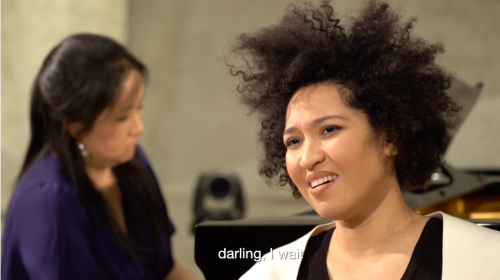 United States Various, Julia Bullock (classical singer) and Laura Poe (piano): Recorded at Konzerthaus Blaibach, Germany, 10.12.2020, exclusively for Cal Performances, Berkeley, California. Available as a livestream from 14.1.2021-14.4.2021. (HS)
United States Various, Julia Bullock (classical singer) and Laura Poe (piano): Recorded at Konzerthaus Blaibach, Germany, 10.12.2020, exclusively for Cal Performances, Berkeley, California. Available as a livestream from 14.1.2021-14.4.2021. (HS)

Hugo Wolf – ‘Auch kleine Dinge’ (Italienisches Liederbuch); ‘In dem Schatten meiner’, ‘Locken Bedeckt mich mit Blumen’ (Spanisches Liederbuch)
Robert Schumann – (Dichterliebe) ‘Die Rose, die Lilie, die Taube, die Sonne’, ‘Wenn Ich in deine Augen seh’, ‘Ich grolle nicht’, ‘Und wüssten’s die Blumen, die kleinen’, ‘Hör’ ich das Liedchen klingen’
Kurt Weill – ‘Speak Low’ (One Touch of Venus); ‘Denn wie man sich bettet, so liegt man’ (The Rise and Fall of the City of Mahagonny); ‘Wie lange noch?’, ‘Lost in the Stars’ (Lost in the Stars)
William Grant Still – ‘The Breath of a Rose’
Margaret Bonds – ‘The Negro Speaks of Rivers’, ‘Winter Moon’ (music prepared by Louise Toppin)
John Adams (arr. Laura Poe and Julia Bullock) – Three Women: Josefa, Ah Sing, and Dame Shirley (Girls of the Golden West): ‘Ven esta noche, amado’ (Josefa), ‘The Ship Has Reached America’ (Ah Sing), ‘Sometimes, I Lounge Forlornly’ (Dame Shirley)
Richard Rodgers – ‘The Sound of Music’, ‘The Lonely Goatherd’, ‘Something Good’, ‘Climb Every Mountain’, ‘Edelweiss’ (The Sound of Music)
On a program with music by Hugo Wolf, Robert Schumann, Kurt Weill and two of America’s under-appreciated Black composers, Julia Bullock strikes the most surprising and delightful note with an utterly fresh and unique version of ‘The Sound of Music’, the title song of Richard Rodgers’ and Oscar Hammerstein’s 1959 musical. She applies an intimate and poignant style, banishing any lurking image of Julie Andrews belting out ‘The hills are alive…’ in a mountain meadow. The approach draws a connection with how strongly we all miss the personal communication of live performances as the pandemic rages. The song, after all, ends with ‘My heart will be blessed with the sound of music / And I’ll sing once more’.
Bullock chose songs ‘that speak to the present moment’, as she explains in opening remarks of the 80-minute video recital, which debuted recently for Cal Performances (and available on demand through 14 April). In a year that has been ‘unrelenting in its intensity’, she wanted the program to ‘reflect the small things in life that are precious’.
In the credits, Bullock identifies as a ‘classical singer’ rather than a soprano. If this gives her license to explore the lower notes of Weill’s songs, all the better, and her superbly calibrated voice and operatic acumen refresh Rodgers’s songs. ‘The Lonely Goatherd’, a lively ditty with yodeling, revels in rhythmic bounce. ‘Climb Every Mountain’ avoids the pomp of most singers in favor of quiet resolve. The simple beauty of ‘Edelweiss’ closes the set.
Pianist Laura Poe, whom Bullock met when she sang in the premiere of John Adams’s opera Girls of the Golden West at San Francisco Opera in 2017 (review click here), connects seamlessly with Bullock throughout the recital, which includes their joint arrangement of excerpts from this opera about the California Gold Rush.
They chose three pieces, each reflecting the key women’s roles. ‘Ven esta noche, amado’, the Mexican bar owner Josefa’s song of longing, reflects a hesitant resolve. Poe follows with a good transcription of ‘The Ship Has Reached America’ (the music for the Chinese prostitute Ah Sing is high-range coloratura which, for all of Bullock’s talents, she is not). The highlight, though, is the opera’s evocative epilogue, ‘Sometimes, I Lounge Forlornly’, in which the pioneer Dame Shirley (Bullock’s role) describes what she sees from her window: piles of gravel dug from the mines obscuring the beauty of the mountains, except for an expanse of blue sky. It is set to glimmering chords that fade into silence.
Bullock brings vivid character and warmth to three Hugo Wolf songs that perfectly apply to life in a year of COVID: A woman acknowledges that ‘Small things, too, can please us’, considers whether to wake her sleeping lover and contemplates her death. Five pieces from Robert Schumann’s Dichterliebe explore human connections of love, beginning with a softly contemplative ‘Die Rose, die Lilie, die Taube, die Sonne’ and concluding with the lover’s wistful ‘Hör’ ich das Liedchen klingen’ after the loss of her partner.
Bullock takes her own approach to Kurt Weill’s wry, jazzy songs, indelibly identified with the world-weary Lotte Lenya and, later, Teresa Stratas. Bullock unabashedly delves into the individual character of each song, bringing out the sultry aspects of ‘Speak Low’; the steely resolve of ‘How you put yourself to bed, is how you lie’; and the unsettling disappointment of ‘How Much Longer?’ Often sung as a sort of anthem, ‘Lost in the Stars’ finishes the set with smooth, unpolished beauty. The final line, ‘And we’re lost out here in the stars’, can apply to many of us right now.
It wouldn’t be a Julia Bullock recital without a nod to music associated with African-Americans. The midpoint of the recital features three songs set to poems by Langston Hughes, a leader of the Harlem Renaissance. In William Grant Still’s ‘The Breath of a Rose’, she evokes the fleetingness of love. She digs deep into Margaret Bonds’s soulful ‘Negro Speaks of Rivers’ and finds the pain embedded in the short ‘Winter Moon’.
Director Bernhard Fleischer, who directed the video of Yo-Yo Ma’s 2018 Bach project, specializes in video classical concerts, and it shows in the simplicity and insights of his choice of shots and angles. This should be Exhibit A for how to present a recital. Fleischer doesn’t play with lighting, or introduce distractions such as camera movement. Instead, he places the human presence of the artists in the context of the stage’s concrete walls, mixing eye-level camera angles, close-ups and midrange and long shots to enhance both the music and Bullock’s amazing characterizations.
Harvey Steiman
